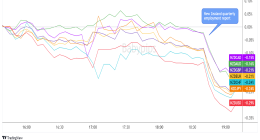ENERGY prices will go up today as millions of households will find out how much their energy bills are set to rise by this year.
The energy price cap announcement was due to come next week, but has been brought forward to February 3 at 11am as Ofgem will announce what the new cap means for families.
As things stand, there are 22million people on default or standard tariffs offered by the country’s energy providers, according to Ofgem estimations.
If a fixed rate deal hasn’t finished and you haven’t switched yet, you’re likely on one of these contracts.
What is the energy price cap?
The energy price cap sets the maximum figure that a customer can be charged on a variable dual-fuel rate.
This measures typical usage of gas and electricity over a six-month period.
The price cap was originally set up in January 2019 with terms decided by industry regulator Ofgem, in an effort to limit how much providers can charge on default energy bills to spare Brits from being unfairly charged.
In previous years families were able to save money by shopping around for energy deals, but since then a number of companies have gone bust, leaving people with hardly any options on tariffs.
How much is the energy price cap?
The cap on standard variable and default tariffs is set by Ofgem.
Currently, it is priced at £1,277 per year typically for an average household paying via direct debit.
This is after a 12 percent rise in October, which took it to its highest-ever level.
However, this doesn’t mean that this is the price everyone will pay – rather it’s the rates that are called, so this means the more you use the more you will pay.
The current rates are set at:
4p per killowatt hour (p/kWh) for gas
21p/kWh for electricity
A standing charge of 26p per day for gas
A standing charge of 25p per day for electricity
How does the energy price cap work?
The energy price cap works by setting a limit on the maximum amount suppliers can charge for each unit of gas and electricity.
The regulator, Ofgem, sets a maximum daily standing charge which is what households have to pay in order to have their home connected to the National Grid.
However, the energy price cap only applies to providers’ standard and default tariffs.
This means if you’re on a fixed-term energy deal, the cap doesn’t apply to you.
If you’ve not switched in the last year or so, it’s more than likely you’re on a capped tariff.
Is it cheaper to switch or stick with the default tariff?
There are usually no prizes for loyalty when it comes to energy bills.
Comparison websites such as MoneySuperMarket estimate that Brits could save around £250 a year by switching from a default to a fixed tariff.
However, rates are rising across the board at the moment as all suppliers are getting hit by rising gas prices and increased demand.
Some providers have pulled their best tariffs and comparison site ComparetheMarket eve frozen its switching tool because it said there were not enough good quality deals to show its users.
This is now unfrozen and the site is once again offering energy provider comparisons.
However, it said: ” In most cases, fixed tariffs currently on offer are more expensive than being on a default or variable tariff.
“We urge people to check carefully before fixing any deal at this point in time.”
Some 27 firms have folded since August, including Utility Point and People’s Energy.
Others including Bulb have said they need support but the government has rejected calls to ‘bail out’ firms.
The lack of competition could also mean higher prices.
How to save on your energy bills
SWITCHING energy providers can sound like a hassle – but fortunately it’s pretty straight forward to change supplier – and save lots of cash.
Shop around – If you’re on an SVT deal you are likely throwing away up to £250 a year. Use a comparion site such as MoneySuperMarket.com, uSwitch or EnergyHelpline.com to see what deals are available to you.
The cheapest deals are usually found online and are fixed deals – meaning you’ll pay a fixed amount usually for 12 months.
Switch – When you’ve found one, all you have to do is contact the new supplier.
It helps to have the following information – which you can find on your bill – to hand to give the new supplier.
- Your postcode
- Name of your existing supplier
- Name of your existing deal and how much you pay
- An up-to-date meter reading
It will then notify your current supplier and begin the switch.
It should take no longer than three weeks to complete the switch and your supply won’t be interrupted in that time.
This has already created a situation where some fixed deals are £800 more than the energy price cap so it is important to do your research when shopping around and make sure you aren’t paying over the odds.
MoneySavingExpert founder Martin Lewis has warned that there are “very, very few” deals that are cheaper than standard variable prices at the moment.
This means households could stick with the price cap for now and hope it falls in April or try to lock-in cheaper deals before they disappear.
MoneySavingExpert has a guide to finding the best deal possible in the current circumstances.
Here is everything you need to know about the gas price crisis.
Some customers may be eligible for extra help such as payment breaks and emergency credit to top up prepayments.
Low income households, especially pensioners, could get a £140 rebate off their energy bill under the Warm Home Discount.
We pay for your stories!
Do you have a story for The Sun Online Money team?










